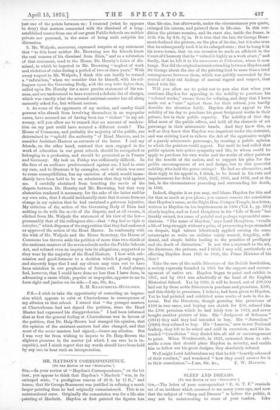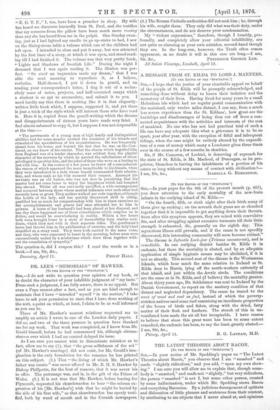SLEEP AND DREAMS.
[TO TES EDITOR OP THE "SPECTATOR."]
Sia,—The letter of your correspondent " E. G. T. F." reminds me of an incident which occurred to me many years ago, and now that the subject of "Sleep and Dreams" is before the public, it may not be uninteresting to some of your readers. Like
"E. G. T. F.," I, too, have been a preacher in sleep. My wife has heard me discourse learnedly from St. Paul, and she testifies that my sermons from the pillow have been much more rousing than any she has heard from me in the pulpit. One Sunday even- ing, just as I had lighted my candle to go up-stairs to bed, I saw on the dining-room table a volume which one of the children had left open. I intended to close and put it away, but was attracted by the first lines of a story, at which it was open, and stood read- ing till I had finished it. The volume was that very pretty book, 4, Lights and Shadows of Scottish Life." During the night I dreamed that I was again reading it. The illusion was per- fect. " So vivid an impression made my dream," that I was able the next morning to reproduce it, as I believe, verbatim. Half-dressed, I put it down in pencil, and on reading your correspondent's letter, I dug it out of a melan- choly mass of notes, projects, and half-executed essays which a student is so apt to accumulate, and submit it to you. I need hardly say that there is nothing like it in that elegantly- written little book which, I suppose, suggested it, and yet there is just a trick of the style which will interest those who have read it. Here it is, copied from the pencil-writing which the dreams and disappointments of sixteen years have made very faint. I feel almost ashamed to copy it, but I suppose I was not responsible at the time The movements of a young man of high family and distinguished abilities had for some months excited the anxieties of his friends and stimulated the speculations of his acquaintances. He was frequently absent from his home, and beyond the fact that he was on the Con- tinent, no one knew of his retreat. That the charm which beguiled him from England was of a tender character, was evident from the playful character of the answers by which he parried the solicitations of those privileged to question him, and the jokes of those who were on a footing to jest with him. In the course of a few years he threw off a concealment the reason of which appeared the more inexplicable to his friends, when they were introduced to a lady whose beauty commanded their admira- tion, and whose rank as his wife ensured their respect. Amongst his servants was an old butler, who was not slow in perceiving that his master had not come home to enjoy the happiness which had tempted him abroad. Whilst all was outwardly unruffled, a wide estrangement had occurred between those whose mutual influence over each other had recently been so great. They neither walked nor rode together, although the health of the lady, and her quickly discovered skill in riding, qualified her as much for companionship with him in these exercises as her accomplishments and graces had once attracted her to him in private. A horse of her husband's had been placed at her disposal, and one day there happened one of those coincidences which surprise us in fiction, and would be overwhelming in reality. Within a few hours both were brought home in a state of insensibility from similar acci- dents, which they met with in their separate rides. The gentleman's horse had thrown him in the exhilaration of exercise, and the lady's had stumbled on a stony road. They were both carried to the same room, and they, who were separated in heart in the morning, before noon were unconsciously united by a misfortune which drew them together with- out the consolation of sympathy."
The question is, did I compose this ? I read the words as in a book.—I am, Sir, &c.,



































 Previous page
Previous page